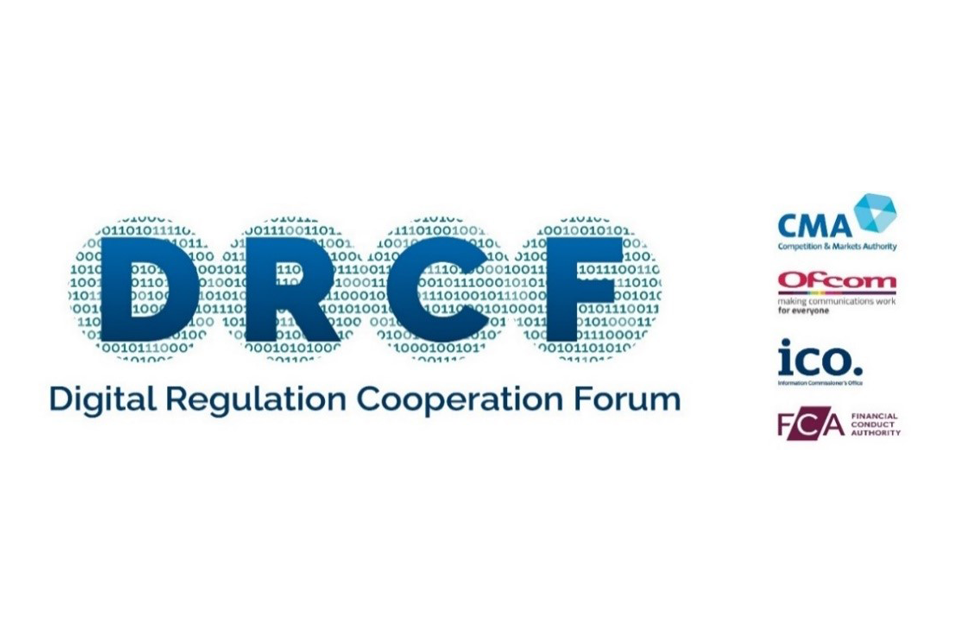Joining up on future technologies
Published 29 November 2021

The Digital Regulation Cooperation Forum (DRCF)[footnote 1] new technology horizon scanning programme will ensure that we have a coherent view of new and emerging digital markets and technologies. Here we set out why we are joining up on future tech, describe our approach and explain how you can be involved in our work.
Delivering a regulatory landscape that enables innovation
Digital innovation drives significant benefits for consumers, businesses, and the wider economy. Our roles as regulators are becoming increasingly important to ensure that consumers’ and citizens’ interests are at the heart of digital innovation. To do this well, we need to keep pace with the changes in digital and online services.
The DRCF member regulators each have ongoing programmes of consumer and future looking research and engagement that inform their work. This includes insights from:
- Ofcom’s work on Internet Futures[footnote 2], Internet Use and Attitudes[footnote 3], and the Emerging Technologies Shaping the Future of Technologies[footnote 4];
- the FCA’s artificial intelligence (AI) research programme and the joint AI Public- Private Forum run jointly between the FCA and the Bank of England;
- the work of the CMA’s DaTA team; and
- the ICO’s Regulatory Sandbox, Innovation Hub and wider technology programme.
We have also shared expertise in relation to specific digital developments, for example in relation to cloud computing and privacy enhancing technologies.
Through the DRCF, we have made good progress this year in collating and synthesising the digital research and knowledge from our four organisations. However, we see benefits for us and for industry in doing more to join up our thinking on future technologies.
Joining up on Future Tech: three initial priorities
First, we want to make it easier for all to be aware of and find the range of DRCF member’s digital research. Shortly, we will bring together that which is publicly available into one place by building links to relevant work into our own websites. This collation of research helps us and wider stakeholders to access existing knowledge and to identify important gaps where further research is needed.
Second, we will jointly engage with UK small to medium sized companies (SMEs), tech start-up community and academia. We want to hear more from entrepreneurs, engineers and innovators that are creating the technologies, products, and services that will shape UK digital services of the future. Engaging jointly can make it easier and more efficient for smaller companies and organisations to talk to us. Our initial focus for Spring 2022 will be on SMEs in cities with thriving technology sectors across the UK, including Manchester, Edinburgh and London.
Third, we want to accelerate our knowledge building in new or rapidly developing subject areas, especially where there are important potential opportunities or risks. We will convene meet ups that bring together relevant industry, academic and regulatory expertise from the UK and abroad to build shared knowledge. The table below provides some examples of the types of technologies and markets we will be looking at. We plan to hold our first meet up in Spring 2022 on immersive technologies.
Accelerated knowledge sharing: example areas of focus:
- Cloud computing technology
- Privacy enhancing technologies
- Distributed ledger technologies
- Artificial Intelligence technologies (a)
- Quantum technologies
- ‘Internet of Things’ (b)
- Cybersecurity technologies
- Immersive technologies (c)
- Advertising technologies
- Biometric technologies
(a) Including machine learning, (b) including voice assistants and wearable technologies, (c) including virtual and augmented reality technology.
An accessible, inclusive, and iterative approach
We want our joint horizon scanning programme to be as accessible as possible. That is why we are launching an ‘always open’ line of communication through a new mailbox JoiningUpOnFutureTech@ofcom.org.uk.
Interested parties can make us aware of technological developments when it suits them, such as emerging online products or services that are likely to have an impact at the margins of our respective remits or that could affect several of our respective objectives.[footnote 5]
We know that regulators outside of the DRCF and other organisations share our interest in building and sharing knowledge regarding digital developments. We will be engaging with the wider regulatory community through the DRCF Regulatory Roundtable and other UK regulator forums, and other interested parties such as the Regulatory Horizons Council and the Government Office for Science, as part of this programme.
We will be iterative in our approach, learning from these three initial priorities to ensure we are efficient and effective in our approach to horizon scanning longer term. We will update on our progress and future priorities in the upcoming DRCF workplan for 2022-23. The information you share with us will help shape our priorities and inform our future joint work.
-
The DRCF consists of the Competition and Markets Authority (CMA), the Financial Conduct Authority (FCA), Information Commissioner’s Office (ICO) and the Office of Communications (Ofcom). ↩
-
Ofcom, Internet Futures: Spotlight on the technologies which may shape the Internet of the future, July 2021. ↩
-
Ofcom, Emerging technologies shaping the future of communications, January 2021. ↩
-
This mailbox will be hosted by Ofcom who will coordinate sharing the information provided with DRCF members on an ongoing basis. This mailbox is not intended to replace existing means or channels for getting in touch with our respective organisations eg the DRCF members respective general inquiries or complaints processes, the CMA’s cartel hotline or other specific avenues for our respective our organisations. ↩
